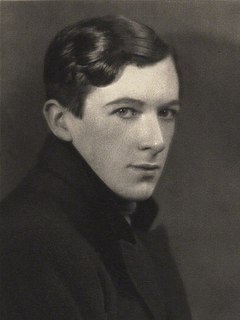A Quote by Cecil Beaton
Mrs Woolf's complaint should be addressed to her creator, who made her, rather than me.
Related Quotes
The notion of the writer as a kind of sociological sample of a community is ludicrous. Even worse is the notion that writers should provide an example of how to live. Virginia Woolf ended her life by putting a rock in her sweater one day and walking into a lake. She is not a model of how I want to live my life. On the other hand, the bravery of her syntax, of her sentences, written during her deepest depression, is a kind of example for me. But I do not want to become Virginia Woolf. That is not why I read her.
I missed the sound of her shuffling her homework while I listened to music on her bed. I missed the cold of her feet against my legs when she climbed into bed. I missed the shape of her shadow where it fell across the page of my book. I missed the smell of her hair and the sound of her breath and my Rilke on her nightstand and her wet towel thrown over the back of her desk chair. It felt like I should be sated after having a whole day with her, but it just made me miss her more.
[Mrs. Allen was] never satisfied with the day unless she spent the chief of it by the side of Mrs. Thorpe, in what they called conversation, but in which there was scarcely ever any exchange of opinion, and not often any resemblance of subject, for Mrs. Thorpe talked chiefly of her children, and Mrs. Allen of her gowns.
I tried to breathe, failing. I clutched her to me, tears slipping from under my closed eyes. It was as if her soul was liquid fire and I could feel her aura, swirling about mine. She was taking my aura. But I wanted to give it to her, to cat her in a small part of me and protect her. Her needs made her so fragile.
Little miss is taught by her mamma that she must never speak before she is spoken to. On this she sits bridling up her head, looking from one to the other, in hopes of being called to and addressed by the name of pretty miss.... But if this should not happen and no one should take any notice of her, she is ready to cry at the neglect. But should there be another miss in the room caressed and taken notice of whilst she is thus overlooked, it will be impossible for her to contain her tears, and blubbering is the word.
Her [Eleanor Roosevelt] father was the love of her life. Her father always made her feel wanted, made her feel loved, where her mother made her feel, you know, unloved, judged harshly, never up to par. And she was her father's favorite, and her mother's unfavorite. So her father was the man that she went to for comfort in her imaginings.
Father, One day, a woman walked into my life. I hurt her deeply with the harshest words possible. I pushed her away as much as I could. But, she still came back to me. She is so much like me; I look at myself often when I look at her. She has the physical wounds that I have. The tears that fill my brain are flowing through her heart as well. I gave her those wounds. I made her cry. I should not have met her. I should not have allowed her to come into the life of a guy like me. Father, I'm regretting it. This is the first time... that I have ever regretted anything in my life.
All of us--all who knew her--felt so wholesome after we cleaned ourselves on her. We were so beautiful when we stood astride her ugliness. Her simplicity decorated us, her guilt sanctified us, her pain made us glow with health, her awkwardness made us think we had a sense of humor. Her inarticulateness made us believe we were eloquent. Her poverty kept us generous. Even her waking dreams we used--to silence our own nightmares.
To be a woman condemned to a wretched and disgraceful punishment is no impediment to beauty, but it is an insurmountable obstacle to power. Like all persons of real genius, her ladyship well knew what accorded with her nature and her means. Poverty disgusted her -subjection deprived her of two-thirds of her greatness. Her ladyship was only a queen amongst queens: the enjoyment of satisfied pride was essential to her sway. To command beings of an inferior nature, was, to her, rather a humiliation than a pleasure.




































